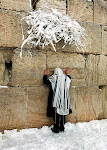Shabbos Mevarchim for Chodesh Elul
The pasuk tells us in this week's parsha:
(דברים יא:כו)
ראה אנכי נותן לפניכם היום ברכה וקללה
Behold I place before you today a blessing and a curse.
There is a similar phrase in Parshas Nitzavim:
(דברים ל:טו)
ראה נתתי לפניך היום את החיים ואת הטוב ואת המות ואת הרע
Behold I have placed before you today life and good, and death and evil.
Why does the Torah switch from blessings and curses to life and death? What is the pasuk in Nitzavim adding? We already know the formula from Parshas Re'eh: mitzvos=blessings, aveiros=curses. What more do we need to know?
The משך חכמה refers us to the few psukim earlier in Parshas Nitzavim. There Moshe Rabbeinu discusses the concept of Teshuva for the first time. Bnei Yisrael are introduced to the idea of a second chance; if at first you don't succeed, try try again. And again. And again. All the way up until the day of your death.
Now, explains the משך חכמה, we can understand what happened between Parshas Re'eh and Parshas Nitzavim. Blessings and curses are things that come in the future, and Moshe is foretelling the potential judgment based upon this year's actions. By Parshas Nitzavim, we've already been introduced to the concept of Teshuva, and we're already at the life and death stage. Either a person chooses life, or he chooses death ח"ו, both in this world and the next.
Rav Mordechai Willig once pointed out that Parshas Re'eh and Parshas Nitzavim always bookend Chodesh Elul in some form or another. This year Re'eh was Shabbos Mevarchim. Sometimes it's the first shabbos in Elul. But whatever the case, these pesukim really get us focused on the proper mindset for the month. During the year we have earned Brachos and Klalos. We have future reward or ח"ו punishment ahead of us. Now we have a month to think about that. We have a month to focus on Teshuva. And at the end of that month, we will have furthered our choice, and now the stakes will be even higher. Did we choose life? Or ח"ו death?
Now is the time to choose. You can't just wake up Rosh HaShana morning and say, okay, time for Teshuva. It has to begin now. May הקב"ה give us all the strength to analyze our actions and change them for the better, אמן כן יהי רצון.

No comments:
Post a Comment